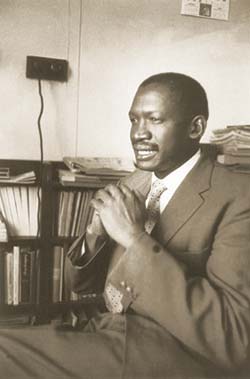Azania may refer to:
Azania may refer to:

The Pan Africanist Congress of Azania is a South African national liberation Pan-Africanist movement that is now a political party. It was founded by an Africanist group, led by Robert Sobukwe, that broke away from the African National Congress (ANC) in 1959, as the PAC objected to the ANC's theory that "the land belongs to all who live in it both white and black" and also rejected a multiracialist worldview, instead advocating a South Africa based on African nationalism.

Robert Mangaliso Sobukwe OMSG was a South African anti-apartheid revolutionary and founding member of the Pan Africanist Congress (PAC), serving as the first president of the organization.

Pan-Africanism is a worldwide movement that aims to encourage and strengthen bonds of solidarity between all indigenous peoples and diasporas of African ancestry. Based on a common goal dating back to the Atlantic slave trade, the movement extends beyond continental Africans with a substantial support base among the African diaspora in the Americas and Europe.

Azania is a name that has been applied to various parts of southeastern tropical Africa. In the Roman period and perhaps earlier, the toponym has been hypothesised to have referred to a portion of the Southeast Africa coast extending from southern Somalia to the border between Mozambique and South Africa. If this is correct, then during classical antiquity Azania was mostly inhabited by Southern Cushitic peoples, whose groups would rule the area until the great Bantu Migration.

The Azanian People's Organisation (AZAPO) is a South African liberation movement and political party. The organisation's two student wings are the Azanian Students' Movement (AZASM) for high school learners and the other being for university level students called the Azanian Students' Convention (AZASCO), its women's wing is Imbeleko Women's Organisation, simply known as IMBELEKO. Its inspiration is drawn from the Black Consciousness Movement inspired philosophy of Black Consciousness developed by Steve Biko, Harry Nengwekhulu, Abram Onkgopotse Tiro, Vuyelwa Mashalaba and others, as well as Marxist Scientific Socialism.
General Justin Metsing Lekhanya was the Minister of Defence and Chairman of the Military Council of Lesotho from 24 January 1986 to 2 May 1991.

The Azanian People's Liberation Army (APLA), formerly known as Poqo, was the military wing of the Pan Africanist Congress, an African nationalist movement in South Africa. In the Xhosa language, the word 'Poqo' means 'pure'.

David Bambatha Maphgumzana Sibeko was a South African political activist. Known as the "Malcolm X of South Africa", he began his political career as a journalist for the black South African magazine Drum. During his tenure with that magazine, he became a leading figure within the Pan Africanist Congress of Azania. During the 1970s he headed the United Nations Observer Mission of the Pan Africanist Congress (PAC) in New York City and used this position to popularize the PAC, particularly among African Americans. In 1979 Sibeko was partially successful in a leadership coup against Potlako Leballo. However, he failed to get support from the Second Azanian People's Liberation Army, recruited from the 1976 student protest generation, and was shot dead during an argument with them at his flat in Oyster Bay in Dar es Salaam, Tanzania on 12 June 1979.
The People's Liberation Army is the military of the People's Republic of China. It may also refer to:
John Nyathi "Poks" Pokela was a South African political activist and Chairman of the Pan Africanist Congress (PAC).
Johnson Phillip Mlambo was a South African politician from Johannesburg.
Potlako Kitchener Leballo was an Africanist who led the Pan Africanist Congress until 1979. Leballo was co-founder of the Basutoland African Congress in 1952, a World War II veteran and primary school headmaster.
Zephania Lekoame Mothopeng was a South African political activist and member of the Pan-Africanist Congress (PAC).

The African People's Convention (APC) is a South African political party formed by Themba Godi, former deputy leader of the Pan-Africanist Congress of Azania (PAC) via floor-crossing legislation, on 4 September 2007. Godi defected along with the PAC's only two provincial representatives, Eastern Cape MPL Zingisa Mkabile and Gauteng MPL Malesela Ledwaba. Godi is the current leader of the APC. The party retained its seat in the National Assembly in the 2009 elections, although it lost both of its representatives in the provincial legislatures of Gauteng and Eastern Cape.
This article covers the history of the Pan Africanist Congress of Azania, once a South African liberation movement and now a minor political party.

Sbusiso Xaba is the national chairman of Pan Africanist Congress of Azania from 2019. He was elected in PAC Mangaung National Congress and re-elected in 2022 Polokwane Congress.
Khoisan X, formerly Benny Alexander, was a South African political activist born in Kimberley, South Africa.

The Azania Liberation Front (ALF) was an armed rebel faction established in 1965, during the First Sudanese Civil War, by exiled members of the Sudan African National Union (SANU). It was a part of the original South Sudan Liberation Movement, the first Sudanese secessionist movement. Its name was taken from the Greek Azania, the Greek designation for the lands of East Africa south of Nubia.

Clarence Mlami Makwetu was a South African anti-apartheid activist, politician, and leader of the Pan Africanist Congress of Azania (PAC) during the historic 1994 elections.
The Pan-African Freedom Movement of East and Central Africa (PAFMECA), later renamed the Pan-African Freedom Movement of East, Central and Southern Africa (PAFMECSA) was a political and Pan-Africanist organisation that was formed to campaign for the independence of the countries of East and Central Africa from colonial and white minority rule. The organisation was formed at a conference held in Mwanza, Tanganyika, from 16 to 18 September 1958. Julius Nyerere and Tom Mboya the Kenyan Pan-Africanist and trade unionist were among the founders. Nyerere came up with the idea for the conference.